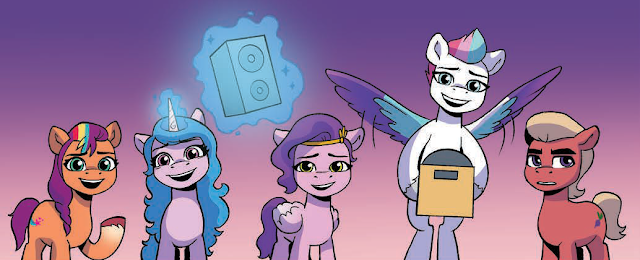Getting a bit of a déjà vu this time around. Dare I say that Hitch is walking in the hoofstep's of Big Macintosh's story? It's hard not the note the parallels as Hitch has to work double-time to create a Maritime Bay celebration.
Check out the full review, with some comparisons and spoilers, after the break!
Let's start this review with an overall statement: I found this issue to be a letdown. There are several factors involved and part of it lies in the art style playing it too safe.
Artist Robin Easter returns for another run at G5, but has yet to find their footing. Going through the comic one will quickly see that each pony often faces a 3/4 turn with a wide grin. It's rare to have any other kind of emotion. The overall impression creates an uneasy feeling throughout the issue as almost every pony seems to adopt the same Cheshire cat grin.
Maritime Bay and the Harvest Day Celebration take central focus this time. While Easter faithfully depicts the town and a few new locations, nothing truly conveys personality. There are very few booths visible or ponies expressing themselves. I'd argue that the strongest panel in the comic features Hitch walking past a kissing booth and a game booth featuring several stuffed figures. The references visible there are fun and I wish that Easter could have added more to the comic to liven up the backgrounds.
The reason the art can't afford to just play it safe is because the story is very simple. In fact, I can summarize it in just this paragraph. Hitch is trying to set up a DJ stand for the evening celebration. Yet Sunny and the others all ask his help, taking time away from setup as Hitch is overly generous. None of the errands are fraught with peril or antagonize Hitch in any way and his interactions with his friends are very brief.
There's a reason I featured Big Macintosh in the banner for this post. "Zen and the Art of Gazeebo Repair" walked a very similar path but managed to become my favorite story for the G4 comics. One of the key differences is that Ponyville burst with personality. All manner of ponies expressing quirks, hosting shows, and celebrating in their own ways. Andy Price filled almost every panel with background images that made the town feel alive. I can't sense that same energy here, where even Pipp's stage/float feels very basic.
"Zen" also featured increasing frustration for the mostly silent protagonist, making his basic hunt for nails much more an ordeal. Hitch is not presented as feeling any sort of pressure. Rather, he overtly states at comic's start how much he loves helping ponies so the constant intrusions never create a mounting tension. There is a brief mention that Hitch can't perform without his headphones. In an example of failing to follow "Checkov's Gun", he is never at risk of losing and having to seek out this prized equipment.
There was another opportunity to create a sense of tension. Throughout this "Old Man Discord" arc, Sunny has been over-stressed about finding the stolen unity crystal. It's weighed upon her almost every appearance. If Hitch were working to make the festival exceptionally high-energy to cheer her up, we would get to see all of Hitch's actions in a new light and further celebrate his efforts. The question of whether or not the celebration would work could provide some extra tension. Yet Sunny is just as excited as Hitch if not moreso. She is in the middle of the celebrations and thus any worry about the larger conflict goes unmentioned. In fact, there's only a single line that references Discord's threat.
Yet by the end I find that the most troubling aspect of this comic is the moral. Having given of his time, Hitch is almost too late to start his session but the others come to return the favor. Throughout the comic, Hitch has had to justify himself to Kenneth the bird, who serves as a kind of shoulder angel with his perpetual glower. Time and again Hitch says that he knows he can say "no", but never does. And by comics end he has not suffered any consequence for his time mismanagement.
My fear is that people will think I'm denouncing generosity. Far from it; Hitch is showing very positive traits. Yet too much of anything, even a virtue like generosity, can become a self-destructive vice. Hitch needs to demonstrate how to say no. It's a vital function for self-care. You need to respect your own time as much as the time of others. The group coming together to help at the end is also a very positive example but I worry that it sends the message that time given will always be answered in kind. While one can hope that folks will pay that kindness forward, it's also very possible that it won't come back full circle. Plus, if you are only generous with the expectation of reciprocity, you're going to wind up very cynical.
This comic needs much more energy to give a very simple premise life. Unfortunately, what we get is a very safe, basic presentation that doesn't offer much by way of surprise. The very brief appearance by Sprout and Phyllis is the biggest highlight, and even then it's just a little extra karma from the movie.
If you have read this comic, I recommend going back to "Zen and the Art of Gazeebo Repair" and explore how the two comics contrast. Otherwise, we can give this comic a pass and move on to the next issue.
I'm Silver Quill. Thanks for reading!
Silver Quill on Twitter
DeviantArt
Youtube

















































